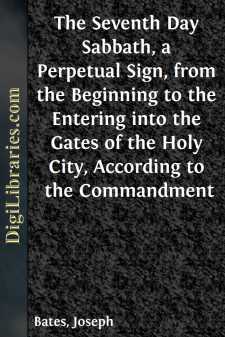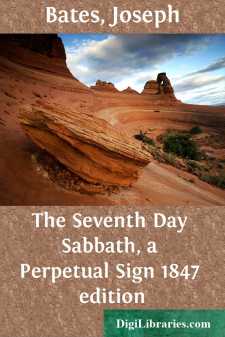Categories
- Antiques & Collectibles 13
- Architecture 36
- Art 48
- Bibles 22
- Biography & Autobiography 813
- Body, Mind & Spirit 142
- Business & Economics 28
- Children's Books 14
- Children's Fiction 11
- Computers 4
- Cooking 94
- Crafts & Hobbies 4
- Drama 346
- Education 46
- Family & Relationships 57
- Fiction 11829
- Games 19
- Gardening 17
- Health & Fitness 34
- History 1377
- House & Home 1
- Humor 147
- Juvenile Fiction 1873
- Juvenile Nonfiction 202
- Language Arts & Disciplines 88
- Law 16
- Literary Collections 686
- Literary Criticism 179
- Mathematics 13
- Medical 41
- Music 40
- Nature 179
- Non-Classifiable 1768
- Performing Arts 7
- Periodicals 1453
- Philosophy 64
- Photography 2
- Poetry 896
- Political Science 203
- Psychology 42
- Reference 154
- Religion 513
- Science 126
- Self-Help 84
- Social Science 81
- Sports & Recreation 34
- Study Aids 3
- Technology & Engineering 59
- Transportation 23
- Travel 463
- True Crime 29
The Seventh Day Sabbath, a Perpetual Sign, from the Beginning to the Entering into the Gates of the Holy City, According to the Commandment
by: Joseph Bates
Categories:
Description:
Excerpt
THE SABBATH.
FIRST QUESTION IS, WHEN WAS THE SABBATH INSTITUTED?
Those who are in the habit of reading the Scriptures just as they find them, and of understanding them according to the established rules of interpretation, will never be at a loss to understand so plain a passage as the following: "And God blessed the seventh day, and sanctified it; because that in it he had rested from all his work which God created and made." Gen. ii: 3. Moses, when referring to it, says to the children of Israel, "This is that which the Lord hath said, to-morrow is the rest of the holy Sabbath unto the Lord." Exod. xvi: 23.
Then we understand that God established the seventh day Sabbath in Paradise, on the very day when he rested from all his work, and not one week, nor one year, nor two thousand five hundred and fourteen years afterwards, as some would have it. Is it not plain that the Sabbath was instituted to commemorate the stupendous work of creation, and designed by God to be celebrated by his worshipers as a weekly Sabbath, in the same manner as the Israelites were commanded to celebrate the Passover, from the very night of their deliverance till the resurrection of Jesus from the dead; or as we, as a nation, annually celebrate our national independence; or as type answers to antetype, so we believe this must run down, to the "keeping of the Sabbath to the people of God" in the immortal state.
It is argued by some, that because no mention is made of the Sabbath from its institution in Paradise till the falling of the manna in the wilderness, mentioned in Exo. xvi: 15, that it was therefore here instituted for the Jews, but we think there is bible argument sufficient to sustain the reply of Jesus to the Pharisees, "that the Sabbath was made for man and not man for the Sabbath." If it was made for any one exclusively it must have been for Adam, the father of us all, two thousand years before Abraham (who is claimed as the father of the Jews) was born. John says, the old commandment was from the beginning—1: ii: 7.
There is pretty strong inference that the antideluvians measured time by weeks from the account given by Noah, when the waters of the deluge began to subside. He "sent out a dove which soon returned." At the end of seven days he sent her out again; and at the end of seven days more, he sent her out a third time. Now why this preference for the number seven? why not five or ten days, or any other number? Can it be supposed that his fixing on upon seven was accidental? How much more natural to conclude that it was in obedience to the authority of God, as expressed in the 2d chap. of Gen. A similar division of time is incidentally mentioned in Gen. xxix:—"fulfill her week and we will give thee this also; and Jacob did so and fulfilled her week." Now the word week is every where used in Scripture as we use it; it never means more nor less than seven days (except as symbols of years) and one of them was in all other cases the Sabbath. But now suppose there had been an entire silence on the subject of the Sabbath for this twenty-five hundred years, would that be sufficient evidence that there was none....



